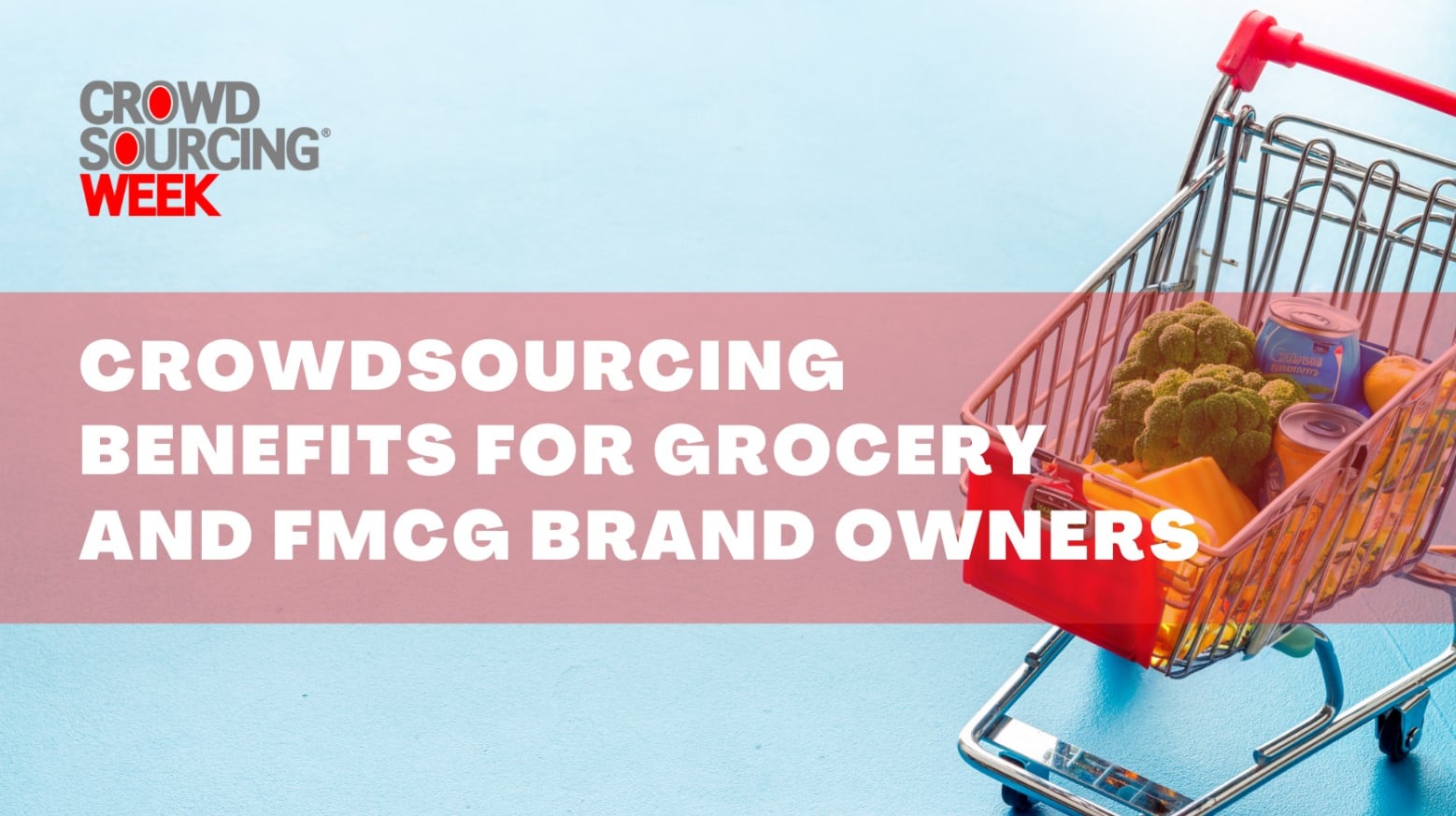The various ways that crowdsourcing can be used for the benefit of organisations in an ever wider range of industries and service sectors continues to grow. The number of platforms that can provide guidance, the number of organisations that have used crowdsourcing, and the number of individuals who have contributed to crowdsourced tasks and projects, all continue to rise. In this article we take a look at the range of benefits crowdsourcing provides for grocery and FMCG (fast moving consumer goods) brand owners.
The FMCG sector includes products like food and drink, health and nutrition, personal care and grooming, and everything in between. They have a weekly or monthly purchase cycle and are quickly-retailed products that sell at a relatively low cost.
Idea generation
Crowdsourcing FMCG data and insights can be used to gather ideas for new product development (NPD), packaging designs, marketing campaigns, plus improved sustainability, from a large and diverse group of people. Here are examples.
NPD
In 2022, Nestle increased the annual number of new products launched, and reduced the time taken to bring new products to market from an average of 33 months to 12. Crowdsourcing was a key element of these improvements, accelerating idea generation internally, externally and digitally.
- Nestle established an internal Shark Tank and encouraged employees of any discipline to suggest product ideas. As an example, an employee in the pet food division had a child who was teething, and didn’t want them chewing on plastic: a teething ring made of food was developed.
- Externally, Nestle collaborated with 60 startups. This brought together creative innovation with corporate ability to scale quickly. The company also closed a third of its own R&D sites, and invested the money in accelerators and startup innovation hubs.
- Digitally, Nestle developed AI and data processing tools to automate to crowdsourcing among vast amounts of clinical data on food research, plant-based developments and new recipes.
In 2020, Lay’s crowdsourced new potato chip flavours inspired by iconic dishes from various regions of the United States. Fans could vote for their favourite flavours and the winning flavours were added to the Lay’s line-up.
Also in 2020, Oreo crowdsourced ideas for new cookie flavours and cream fillings through a social media campaign. Fans could suggest new flavour combinations and vote on their favourites, and the winning flavour was released as a limited edition product.
In Denmark, during Covid, the Coop supermarket launched a temporary webshop to help small, pandemic-affected producers to sell goods directly via their Coop Crowdfunding platform. Over a hundred companies sold goods on the temporary webshop that were bought by more than 4,000 customers. This initiative is now a permanent online marketplace, and crowds of selected customers have the opportunity to decide which products to support, and potentially help them gain a store listing. The Head of Coop Crowdfunding, Nicolai Jæpelt, hopes manufacturers grow so large that they can be stocked on-shelf by the nationwide chain.
In 2022, Unilever invited startups, scaleups and academic spinouts to partner with its teams, through The Positive Beauty Growth Platform. They want new products that incorporate brilliant functional ingredients that work with nature in their Beauty & Personal Care products – and in their packaging. Baz Saidieh, Global Head of the Unilever Foundry, Unilever’s collaborative innovation network, said: “Startup-led partnerships are an important pillar to drive growth and innovation. The Positive Beauty Growth Platform is proving a catalyst of finding the greatest startup innovations and powering experimentation at scale.”
Packaging
In 2019, Nestle launched an open innovation challenge in China, calling on people to submit solutions in areas of sustainable packaging.
Crowdsourcing fmcg marketing
In 2021, Doritos crowdsourced their Super Bowl ad campaign by inviting fans to submit their own 30-second spots for the chance to air during the big game. The winning ad was chosen through online voting.
Pepsi Max’s “The Sound of Max” campaign launched in Europe in 2021. It invited music producers and fans to submit their own music tracks to be featured in a new Pepsi Max commercial. The campaign aimed to highlight the connection between music and the Pepsi Max brand and it received hundreds of submissions from around the world.
Today, many businesses want to take advantage of the expanding Content Creator and Influencer economies. Crowdsourcing can be used to gather user-generated content, such as social media posts, product reviews and customer stories. Content creators and influencers provide the perfect option for brands looking to direct their audience to their online landing pages. With swipe-up links, affiliate ads and product placement as viable options for FMCG products, many brands in this sector recognise the benefits of working with content creators. They can help build brand awareness and credibility in a manner regarded as more authentic than centralised creative work produced by a marketing or advertising agency.
 Tails.com, a pet food home delivery service, wanted to deliver a selection of authentic and engaging content to drive brand awareness, raise brand consideration and drive customer acquisition and sales. The creators the brand worked with produced genuine and informative content to showcase the benefits of feeding dogs this type of food, made with high quality ingredients. Tails.com’s paid-for advertising media concentrated on a “reduce waste” message, which enabled the brand to prove the success of their influencer marketing strategy which used different messages.
Tails.com, a pet food home delivery service, wanted to deliver a selection of authentic and engaging content to drive brand awareness, raise brand consideration and drive customer acquisition and sales. The creators the brand worked with produced genuine and informative content to showcase the benefits of feeding dogs this type of food, made with high quality ingredients. Tails.com’s paid-for advertising media concentrated on a “reduce waste” message, which enabled the brand to prove the success of their influencer marketing strategy which used different messages.
Sustainability
In 2021, Unilever launched a global startup collaboration program, calling on innovators to submit sustainable food solutions that can help reduce the environmental impact of the food industry. The program received over 300 applications from 40 countries.
Consumer insights
It is critical for FMCG brands to inform their marketing activities with a regularly updated understanding of their target audience. Crowdsourcing can help FMCG brands gather feedback and insights from their target consumers, not only about product preferences but also ESG expectations and media behaviour, which can aid product development, marketing strategies, and overall brand positioning.
Boosts brand loyalty
Crowdsourcing customer involvement in such activities can help FMCG brands build brand loyalty by involving consumers in the brand’s decision-making and product selection processes, and making them feel like they are part of the brand community.
Crowdsourcing FMCG store checks
Store checks can be carried out by crowds of shoppers. They can check products are stocked and well presented on the shelves, and at what height. They can check that bin-end installations and marketing materials are in place, and the relative presence of competitors. Phone images can be sent immediately to a central point for collation and assessment.
Roamler is one of the mobile crowdsourcing platforms that allow companies to outsource tasks to a community of smartphone users. The Roamler app enables them to earn money by completing tasks while they are out shopping, such as taking photos of products on store shelves, conducting surveys, or performing mystery shopping activities.
In 2020, Nestle partnered with Roamler to launch a campaign that aimed to increase sales of Nescafe coffee in the Netherlands. The campaign involved Roamler users visiting grocery stores to conduct in-store promotions and provide feedback on Nescafe displays and pricing. Roamler has also been used by other fmcg brands including Heineken, Coca-Cola, Unilever and PepsiCo for various tasks such as store audits, promotional execution, product demonstrations, and more.
After a successful pilot in January 2023, Roamler launched its newest monitor, the Monday Morning Price Tracker (MMPT), in Germany in March 2023. Every Monday morning before 10.30 am, 36 to 58 stores across Germany will be visited to get the latest data on real-time prices, as well as observations on sub-category seasonality to provide feedback for production teams. The data will be analysed immediately with results reported before 11.15 am the same day. There are plans to extend MMPT to France and the UK.
Crowdsourcing can help FMCG and grocery brand owners create more consumer-centric products, improve brand perception, and drive engagement and loyalty among their target audiences.






0 Comments